From concept to impact: CALES commercialization triples
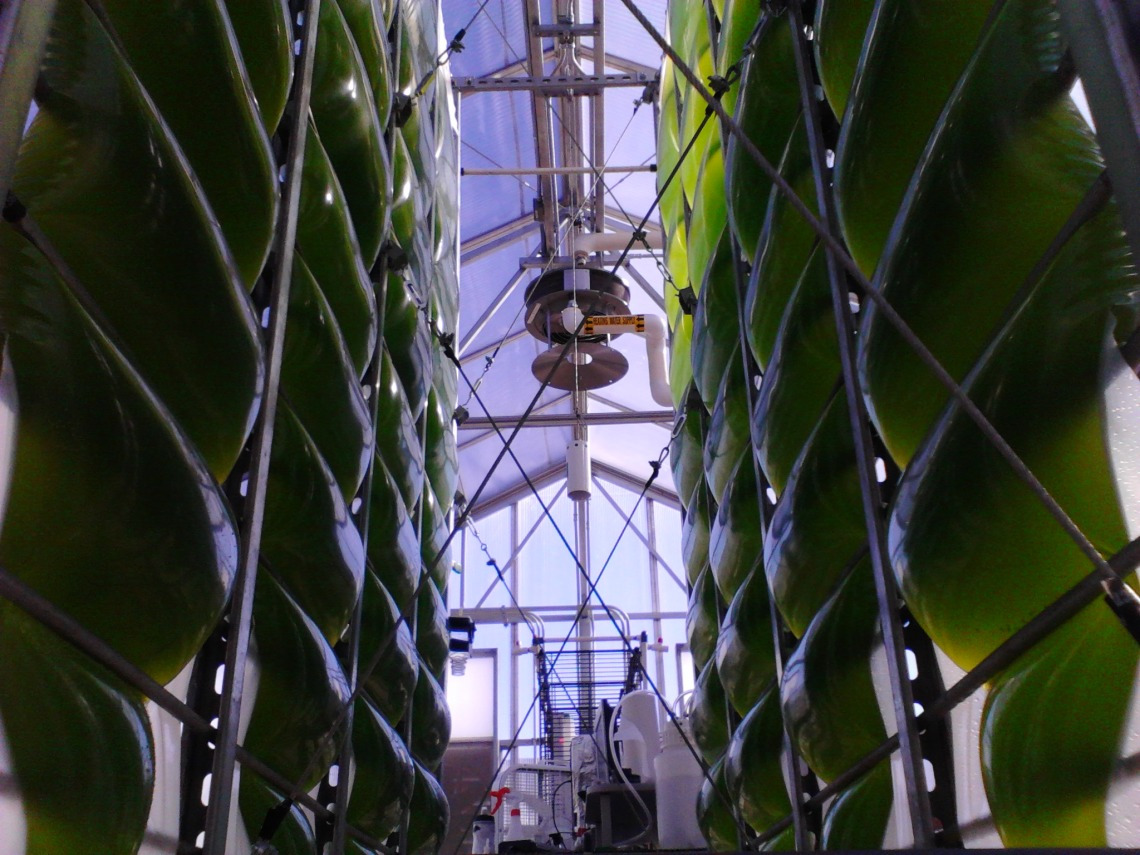
The UArizona-invented Air Accordion Photobioreactor produces low-cost, large-scale and environmentally sustainable microalgae products used to create vaccines and health supplements like omega-3 fatty acids.
Joel Cuello
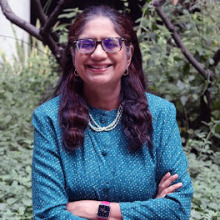
Sadhana Ravishankar came to the United States in the early 1990s, amid a foodborne illness outbreak that claimed the lives of four children and sickened hundreds more. The resulting food safety investigation gripped national headlines and propelled the exotic-sounding bacterium Escherichia coli, or E. coli, out of the lab and into the public consciousness.
The incident sparked a new purpose and passion for food safety in Ravishankar, a professor in the School of Animal and Comparative Biomedical Sciences who would go on to dedicate her research to combating foodborne pathogenic bacteria and the investigation of natural antimicrobial solutions.
Through her work, Ravishankar developed an organic washing solution for leafy greens that utilizes plant-based formulations that are not only food compatible, but natural and safe for human consumption. In 2021, Ravishankar was recognized as the University of Arizona’s Inventor of the Year for her work on natural antimicrobial products.
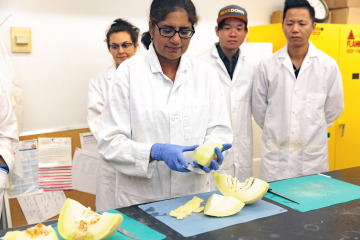
Sadhana Ravishankar works with melon in her lab at the University of Arizona School of Animal and Comparative Biomedical Sciences.
Ravishankar, together with her co-founder and associate research professor Bibiana Law, launched a new company to commercialize the inventions developed in her lab. The startup, PhytoCentric Solutions, provides testing services to the food industry, as well as proprietary natural antimicrobial products for consumer applications. The development of this technology was driven by the “clean label movement,” a consumer movement that demands products with no artificial ingredients or synthetic chemicals, Ravishankar explained.
“Consumers want natural products that are effective, yet do not cause harm to the environment," Ravishankar said. "Our formulations have a specific niche market in food safety, to provide an effective alternative solution to chemicals with the added benefit of residual activity for higher efficacy that can enhance safety during transportation and storage.”
Not so long ago, the ground-breaking science university researchers devoted their lives to was, more often than not, left to linger among the pages of scholarly journals.
Enter Tech Launch Arizona, the commercialization arm of the university that helps faculty navigate everything from intellectual property protection to technology licensing and startup support. In its 10-year history, the office has licensed over 500 UArizona inventions and launched over 130 startups.
Since 2012, CALES faculty have worked with Tech Launch Arizona or “TLA” to move new inventions and technologies stemming from university research into the marketplace, where they can create lasting social and economic impact
CALES research touches every aspect of life, from food security and agricultural production to environmental remediation and natural resource management, explained Tod McCauley, who serves as the assistant director of licensing for the college.
“I’ve been working closely with our CALES faculty and researchers to develop a broad-based pipeline of novel, impactful technologies over the past ten years,” McCauley said. “In that time, the college has seen the number of new inventions reported and patents filed nearly triple.”
In 2022 alone, faculty within the college have put forward 23 invention disclosures and filed 36 patents. Below are just a few highlights of the innovation born from CALES research over the last ten years:
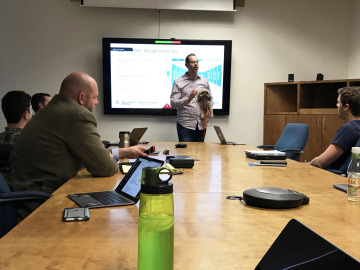
With help from his dog, Rudy, Lyons made his pitch on the final day of the NSF I-Corps Program offered by Tech Launch Arizona.
Paul Tumarkin, Tech Launch Arizona
Howl for good dog breath!
Researchers in the School of Plant Sciences developed a harmless bacteria strain to battle bad breath in our furry friends. When administered orally, the additive produces a minty aroma that improves dogs' breath, said inventor Eric Lyons, who developed the technology with co-inventor David Baltrus.
"The applications of the invention are vast," Lyons said. "Our plan is that they will eventually find a home among all sorts of pet treats, food and oral care products."
Other products, such as toothpastes and chew treats, use flavors and scents to cover bad breath. When the harmless bacterial strain Lyons developed enters a dog's mouth, the bacteria remain for about two hours, producing a pleasant smell. The bacteria could be incorporated into specially formulated treats, chews and food for dogs, making them easy to use, Lyons explained.
Together, Lyons and Baltrus, launched the startup company uPetsia to develop and commercialize the harmless bacteria strain to battle bad dog breath and, earlier this year, the company was named one of five winners of the 2022 annual Purina Pet Care Innovation Prize.
Creating sustainable products from algae
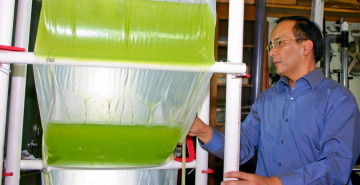
Professor Joel Cuello fine tunes the Accordion photobioreactor at the UA Campus Agricultural Center.
College of Engineering, University of Arizona
Biosystems engineering professor Joel Cuello and his team created a system capable of sustainably producing industrial-scale microalgae and other microorganisms used in pharmaceuticals, nutritional supplements and vaccines. The new technology is called the Air Accordion Photobioreactor.
Bioreactors are used for growing organisms such as yeast, bacteria and algae, as well as plant and animal cells to manufacture a host of products, including antibodies and vaccines. Conventional bioreactors for microalgae that use long tubes, pipes or columns, and even panels made of glass or polycarbonate, are typically expensive to manufacture and often fail to maintain desired mixing characteristics when scaled up for industrial production.
"As an engineering and science professor, commercialization of what my 'bioimagineering' team designs and develops is truly the culminating capstone for our research endeavors – enabling our innovations to be productively applied to create sustained value for all stakeholders in society, including the general public," Cuello said. "It really does make our work so much more impactful and rewarding."
With the ability to scale up, the Air Accordion could have significant implications, representing a leap forward in how bioreactors contribute to sustainability. The impact would be immediate for the omega-3 fatty acid industry, which has been traditionally reliant on fish populations and contributes to harmful overfishing practices.
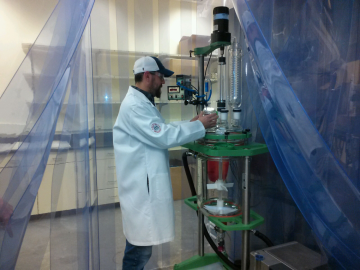
GlycoSurf team member Cliff Coss works with the company’s test reactor at the UA Tech Park.
GlycoSurf, LLC
Eco-friendly specialty chemicals
Raina Maier, a professor of environmental microbiology, is making biodegradable surfactants — as part of a lifelong goal to clean up the environment.
The technology involves a unique chemical synthesis of families of environmentally-friendly surfactants - also known as biosurfactants - which are non-toxic and biodegradable and used as "green" replacements for petroleum-based surfactants. Some of the most commonly recognized surfactants are soaps or detergents.
Surfactants and biosurfactants are used in numerous industries including cosmetics and personal care products, as well as in environmental applications such as oil spill cleanups.
Together with prominent university researchers Jeanne E. Pemberton, Robin Polt, and Cliff Coss, Maier launched the startup GlycoSurf, a specialty chemical company that focuses on the manufacture of novel, environmentally-friendly, bioinspired glycolipid surfactants.

